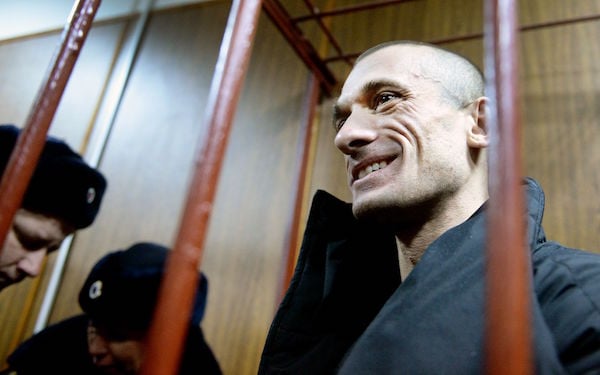
Russian dissident artist Pyotr Pavlensky, who’s currently facing different trials for two separate anti-government performances, has rejected the court’s proposal to drop the criminal charges against him in a case from 2014, Radio Free Europe reports.
Pavlensky was charged with vandalism for the 2014 performance Freedom, which involved burning tires in downtown St. Petersburg and expressing support for anti-Russian protesters in the Ukraine. At the time, he was potentially facing up to three years behind bars for holding the pro-Ukrainian protest.
According to his lawyer, Dmitry Dinze, a judge at the St. Petersburg city court yesterday suggested to close the case as too much time had passed. “I spoke with my client before the meeting, he was against the closure of the case. We have witnesses, they need to be questioned,” Dinze is quoted as saying by the Moscow Times.
During his interrogation, Pavlensky performed his perhaps most radical act to date: making his interrogator flip. After spending just over four months interacting with Pavlensky in 2014, the young investigator Pavel Yasman quit his job at Russia’s Investigative Committee and began preparing to become a lawyer.
At a court hearing in the vandalism case in July 2015, Pavlensky even called Yasman to testify in his own defense. At the time, Pavlensky’s lawyer Dinze—himself a former investigator—said that Yasman’s transformation was not unique. “The system is completely corrupt at present and many people do not want to be a part of it,” he said.
Meanwhile, another trial against Pavlensky opens tomorrow, April 28. The artist was arrested again for vandalism in November 2015 for the performance Threat: Lubyanka’s Burning Door, which involved setting fire to the doors of the Federal Security Service (FSB) headquarters in Moscow. The agency is housed in the former offices of its successor, the Soviet Union’s KGB.
Pavlensky remained in custody from the time of his arrest until April 6, and was transferred in January from jail to a psychiatric hospital for an evaluation.
The criminal charges against him were later changed from “ideologically motivated vandalism” to “damaging a cultural heritage site,” which carry the same maximum sentence of three years in prison. However, the radical artist demanded that he be charged with terrorism.
According to the Moscow Times, the artist appealed his detention with the European Court of Human Rights (ECHR) earlier this month, claiming his arrest was excessive considering he wasn’t hiding from law enforcement officials and did not hurt anyone with his performance. “Pavlensky is not responsible if the police or the FSB disapprove of his artistic work,” the complaint reads.
The dissident artist has gained notoriety in the last few years with a slew of extreme political performances that included nailing his scrotum to the cobblestones of Moscow’s Red Square, cutting off his earlobe while sitting naked of the roof of the infamous Serbsky psychiatric hospital, and sewing his lips shut in support of Pussy Riot.
His door-burning performance Threat was later nominated in the visual art category for the state-funded Innovatsiya (Innovation) Prize. His nomination was rejected by the organizers, which led to protests from the jury, and the subsequent cancellation of the award in February.